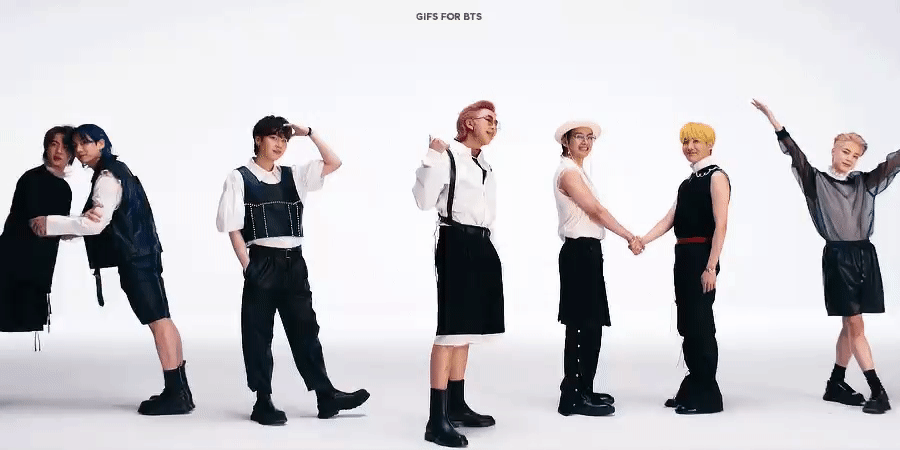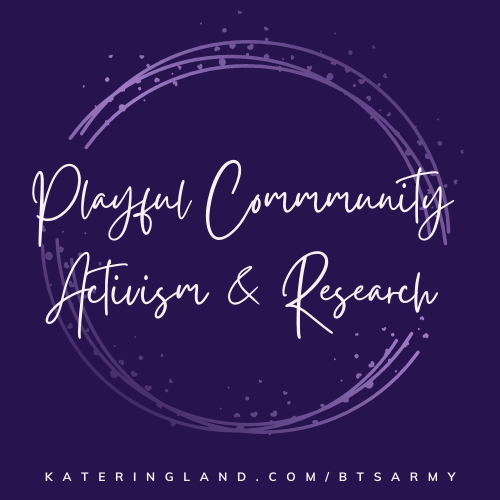We will be presenting this preliminary work at the CSCW 2021 workshop, “Future of Care Work: Towards a Radical Politics of Care in CSCW Research and Practice.”
There has been a recent effort to expand how we think about and design for care in digital spaces—including theorizing about care beyond formal or medicalized activities [1, 8, 9]. But there still remains unanswered questions about care in playful spaces, especially for adults. What types of care occur in these spaces? Our study examines this question by exploring fandoms on social media. We define fandoms as playful (online) communities that align around a particular interest (e.g., specific media or a person). Fandoms are meant to be for fun or pleasure and are often entirely separate from other parts of a person’s life, at least overtly [3].
In particular, our study in an ongoing ethnographic investigation of ARMY, a fandom that supports the Korean music group BTS. ARMY and BTS has piqued the interest of both mass media and academia in the past for some of their altruistic engagements including include supporting their community, artists, music, and social causes [2, 6], as well as BTS’s positive impact on mental health [5]. The care activities this community engages in is also bidirectional with BTS and ARMY caring for each other mutually. ARMY engages in many practices of care, even towards members of the band, defending them when controversies arise or posting words of concern for members’ health.
For this work, we are adopting a decolonial lens to understand care activities as relational and epistemically privilege the members of ARMY. This is especially important as ARMY has experienced delegitimization and stigamatization, including through discriminating on the basis of gender or age (e.g., [4, 7]). The need for a decolonial lens is heightened because of the origin of BTS (i.e., Korea) and the diversity of ARMY membership [2]. In this work, we aim to expand our understanding of care both by looking at playful online spaces where adults socialize and seek informal community support and through a decolonial perspective during data collection and analysis.
AUTHOR BIOS
Kathryn Ringland, PhD, is an Assistant Professor at the University of California Santa Cruz. Her areas of interest include human computer interaction, games studies, and critical disability studies.
Christine Wolf, JD, PhD. is interested in the intersection of CSCW, accessibility, and the future of work.
Tessa Eagle Tessa Eagle (she/her) is a third-year Ph.D. student in Computational Media at the University of California, Santa Cruz. She conducts research within human computer interaction and digital mental health.
Kevin Weatherwax is a fourth-year PhD student in Computational Media at the University of California, Santa Cruz. Presently he is researching satisfaction in robot-mediated collaborations, expressive curiosity for interaction design, and parasocial engagements with nonhuman agents as assistive technology for neurodivergent populations.
REFERENCES
[1] Cynthia L. Bennett, Daniela K. Rosner, and Alex S. Taylor. 2020. The Care Work of Access. In Proceedings of the 2020 CHI Conference on Human Factors in Computing Systems. ACM, Honolulu HI USA, 1–15.
[2] BTS ARMY Documentary Team [@amidocumentary], On Wings of Love [@OWOLMovie], and Research BTS [@ResearchBTS]. 2020. BTS ARMY CENSUS. https://www.btsarmycensus.com/.
[3] Mark Duffett. 2013. Understanding Fandom: An Introduction to the Study of Media Fan Culture. Bloomsbury, New York.
[4] Emily. 2021. Fangirls, Fandom, and BTS – A Letter to the ARMY.
[5] Jin Ha Lee, Arpita Bhattacharya, Ria Antony, Nicole Santero, and Anh Le. 2021. “Finding Home”: Understanding How Music Supports Listerners’ Mental Health Through a Case Study of BTS. In Proc. of the 22nd Int. Society for Music Information Retrieval Conf. 8.
[6] So Yeon Park, Nicole Santero, Blair Kaneshiro, and Jin Ha Lee. 2021. Armed in ARMY: A Case Study of How BTS Fans Successfully Collaborated to #MatchAMillion for Black Lives Matter. (2021), 14.
[7] Lady Flor Partosa. 2021. We Are Not Robots: A Preliminary Exploration into the Affective Link between BTS x ARMY. The Rhizomatic Revolution Review [20130613] 2 (March 2021).
[8] Austin Toombs, David Nemer, Laura Devendorf, Helena Mentis, Patrick Shih, Laura Forlano, and Elizabeth Kaziunas. [n.d.]. Sociotechnical Systems of Care. CSCW 2018 ([n. d.]), 7.
[9] Austin L. Toombs, Shaowen Bardzell, and Jeffrey Bardzell. 2015. The Proper Care and Feeding of Hackerspaces: Care Ethics and Cultures of Making. In Proceedings of the 33rd Annual ACM Conference on Human Factors in Computing Systems (CHI ’15). Association for Computing Machinery, New York, NY, USA, 629–638.


Leave a Reply